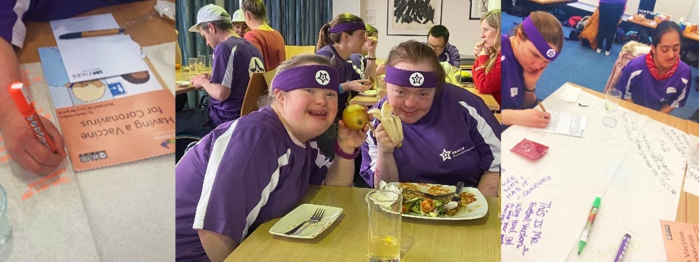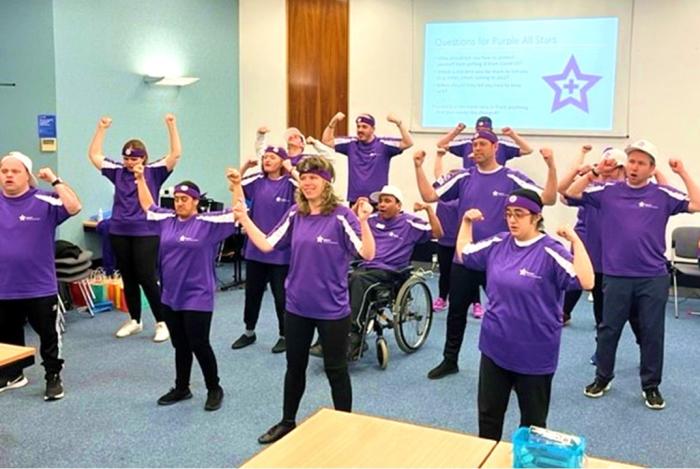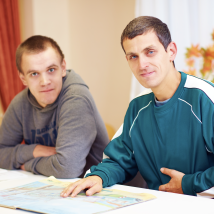Blog post about the CAREVIS project to improve uptake and understanding of the COVID-19 vaccine, supported by ARC EoE

The Purple All Stars at work with CAREVIS researchers
By the Purple All Stars and Helena Wythe, Natalie Pattison and Julia Jones, ARC EoE researchers at the University of Hertfordshire
The Purple All Stars learning disability collective applied their creative skills for delivering health messages to a research project with ARC EoE, to help people with learning disabilities understand and access the COVID-19 vaccination programme. This blog shares their insights on innovative partnership working and co-production in action, supported by the Inclusive Involvement in Research and Prevention and Early Detection in Health and Social Care ARC EoE themes.
The CAREVIS (Co-creation And evaluation of a visual REsource to support COVID-19 Vaccine uptake in people with Intellectual disabilitieS) project team has been working with the Purple All Stars group on the design and evaluation of a co-produced wordless picture resource to explain the COVID-19 vaccination programme to people with a learning disability, in collaboration with the charity ‘Books Beyond Words.’ The study was funded by the Royal College of Nursing Foundation and sponsored by The University of Hertfordshire, with support and funding from ARC EoE.
This study aimed to empower people with a learning disability to fully understand the process of receiving the vaccine through a social story, with the engaging and accessible ethos of Books Beyond Words. We wanted to know if this wordless picture story book - Having a coronavirus vaccine - supported conversations about the coronavirus vaccine between people with a learning disability and those who care for them. We also wanted to know how the picture book was shared within organisations and whether it led to an increase in vaccinations for people with a learning disability.
Time to meet the All Stars
The Purple All Stars touched down at the Fielder Centre in Hatfield on 2 March 2022 to meet with researchers from the University of Hertfordshire working on the CAREVIS project. Together, they discussed research findings from the project and their key messages to policy makers about the COVID pandemic, then the researchers were treated to some stellar All Stars performances!

The Purple All Stars in action!
We have summarised the key points from our discussions about what the All Stars found hard during the pandemic, what would have made their lives easier and how information about COVID-19 and their health should be shared with them.
- Question 1: How has your life changed since the Covid-19 pandemic began, at the beginning of it and now?
During lockdown most people in the group felt sad (missing seeing their friends and family) and scared and worried that they, or their family members, may become ill. Staying at home made one feel like he was in a prison cell. One thought the first lockdown almost had a kind of ‘we’re in it together’ feel in the end. Seeing friends and family when they could did help, although returning home to live with family and their loss of independence did cause friction for some. Frequent Zoom meetings held by the Purple All Stars group, or by other social groups were a way to socialise but Zoom could be frustrating! One person reported that activities online did not feel like a real session, they felt lonely, out of place and confusing.
Some took the opportunity to change their diets and lose weight or do more exercise during this time. Other positive changes were reported: ‘My life has changed, I’m looking after myself. I go to the gym, I do music.’ However, one person liked lockdown, because he could stay at home, watch TV and eat what he wanted. Some said that initially returning to normal life has made them fearful.
- Question 2: What would have helped you during the Covid-19 pandemic?
Seeing friends and family helped. Going for walks in local parks and meeting up with friends for these walks. One person liked to feel particularly clean, having her sister help her bathe and wash her hair.
- Question 3: Who should tell you how to protect yourself from getting ill from Covid-19? Which is the best way for them to tell you (e.g. letter, email, talking to you)? When should they tell you how to keep safe?
One person said that it depended on what the kind of information was. They wrote: ‘It depends on the information that is being conveyed. When it comes to medical information it should be medical people from the NHS, sometimes the government when it comes to business matters via texts, phone calls, news broadcasts, website information, charts and statistics.’
Others agreed that doctors, family, supported living staff, government and social workers all had a part to play in telling them what was happening.
Communication about changes to restrictions or vaccine invitation often went to informal or formal carers, some were unhappy about this: ‘The doctor should talk to me’; while another person was content that the doctor and sheltered housing staff made all the decisions on his behalf: ‘Let staff and doctors decide.’
Everyone agreed that they should be told as quickly as possible how to protect themselves: ‘As soon as they knew they should have warned us so we can be prepared because some people have died.’
- Question 4: Is it important that people understand why they need the vaccine or just to have it anyway?
Everyone thought that it was important to understand why a vaccination was important, so they could make an informed choice on whether to have it or not. An understanding of social responsibility was also expressed: ‘They should understand and ask questions about the vaccine because it might affect people around them.’ Understanding was also seen as important because people could look after themselves and others fully by abiding the rules and restrictions.
The Purple All Stars then performed two of their songs and dances for us ‘So Strong’ and ‘I am Giant’, which left us both thrilled and moved. The Stars shone bright for us and we can’t wait to see them again!
- For more information please contact research fellow Dr Helena Wythe at: h.f.wythe@herts.ac.uk
Watch one of the Purple All Stars' performances with an important health message below:
